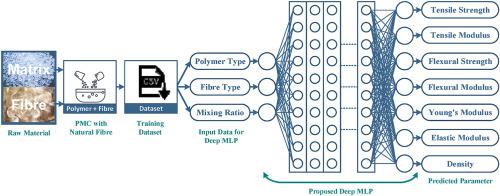Chemosphere ( IF 8.1 ) Pub Date : 2023-06-26 , DOI: 10.1016/j.chemosphere.2023.139346 T. Sathish , Prashant Sunagar , Vikash Singh , Sampath Boopathi , Ravishankar sathyamurthy , Abdullah M. Al-Enizi , Bidhan Pandit , Manish Gupta , Satbir S. Sehgal

|
Polymer Matrix Composite (PMC/Plastic Composite) often referred to as Plastic Composite with Natural fibre reinforcement has a huge interest in industries to manufacture components for various applications including medical, transportation, sports equipment etc. In the universe, different types of natural fibres are available which can be used for the reinforcement in PMC/Plastic Composite. So, the selection of appropriate fibre for the PMC/Plastic Composite/Plastic composite is a challenging task, but it can be done using an effective metaheuristic or optimization techniques. But in this type of optimal reinforcement fibre or matrix material selection, the optimization is formulated based on any one of the parameters of the composition. Hence to analyse the various parameter of any PMC/Plastic Composite/Plastic Composite without real manufacturing, a machine learning technique is recommended. The conventional simple or single-layer machine learning techniques were not sufficient to emulate the exact real-time performance of the PMC/Plastic Composite. Thus, a deep multi-layer perceptron (Deep MLP) algorithm is proposed to analyse the various parameter of PMC/Plastic Composite with natural fibre reinforcement. In the proposed technique the MLP is modified by including around 50 hidden layers to enhance its performance. In every hidden layer, the basis function is evaluated and subsequently, the sigmodal function-based activation is calculated. The proposed Deep MLP is utilized to evaluate the various parameters of PMC/Plastic Composite Tensile Strength, Tensile Modulus, Flexural Yield Strength, Flexural Yield Modulus, Young's Modulus, Elastic Modulus and Density. Then the obtained parameter is compared with the actual value and the performance of the proposed Deep MLP is evaluated based on the accuracy, precision, and recall. The proposed Deep MLP attained 87.2%, 87.18%, and 87.22% of accuracy, precision, and recall. Ultimately the proposed system proves that the proposed Deep MLP can perform better for the prediction of various parameters of PMC/Plastic Composite with natural fibre reinforcement.
中文翻译:

使用深度多层感知器(MLP)技术估计天然纤维增强塑料复合材料的特性
聚合物基复合材料(PMC/塑料复合材料)通常称为天然纤维塑料复合材料增强材料在医疗、运输、运动器材等各种应用的部件制造领域有着巨大的兴趣。在宇宙中,有不同类型的天然纤维可用于 PMC/塑料复合材料的增强。因此,为 PMC/塑料复合材料/塑料复合材料选择合适的纤维是一项具有挑战性的任务,但可以使用有效的元启发或优化技术来完成。但在这种类型的最佳增强纤维或基体材料选择中,优化是基于组合物的任何一个参数来制定的。因此,要在没有实际制造的情况下分析任何 PMC/塑料复合材料/塑料复合材料的各种参数,建议使用机器学习技术。传统的简单或单层机器学习技术不足以模拟 PMC/塑料复合材料的精确实时性能。因此,深层多层提出感知器(Deep MLP)算法来分析天然纤维增强 PMC/塑料复合材料的各种参数。在所提出的技术中,MLP 被修改为包含大约 50 个隐藏层以增强其性能。在每个隐藏层中,都会评估基函数,然后计算基于 sigmodal 函数的激活。所提出的 Deep MLP 用于评估 PMC/塑料复合材料拉伸强度的各种参数、拉伸模量、弯曲屈服强度、弯曲屈服模量、杨氏模量、弹性模量和密度。然后将获得的参数与实际值进行比较,并根据准确率、精确率和召回率来评估所提出的 Deep MLP 的性能。所提出的 Deep MLP 的准确度、精确度和召回率分别达到 87.2%、87.18% 和 87.22%。最终,所提出的系统证明所提出的深度 MLP 可以更好地预测具有天然纤维增强的 PMC/塑料复合材料的各种参数。






























 京公网安备 11010802027423号
京公网安备 11010802027423号